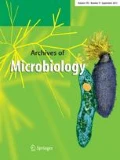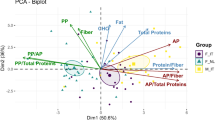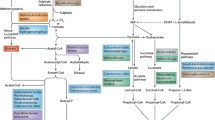Abstract
We first used human flora–associated (HFA) piglets, a significantly improved model for research on human gut microbiota, to study the effects of short-chain fructo-oligosaccharides (scFOS) on the gut bacterial populations. Ten neonatal HFA piglets were assigned to receive basal diets alone or supplemented with scFOS (0.5 g/kg body weight/day) from 1 to 37 days after birth (DAB). The impact of scFOS on the fecal bacterial populations of the piglets before (12 DAB), during (17 DAB), and after (25 and 37 DAB) weaning were monitored by PCR-denaturing gradient gel electrophoresis and real-time quantitative PCR. The Bifidobacterium genus was stimulated consistently, except during weaning, confirming the bifidogenic property of scFOS. At 12 DAB, the Clostridium leptum subgroup was decreased and two unknown Bacteroides-related species were increased; at 25 DAB, the C. leptum subgroup and Subdoligranulum variabile-like species were elevated, whereas one unknown Faecalibacterium-related species was suppressed; and at 37 DAB, the Bacteroides genus was decreased. The results showed that effects of scFOS on non-bifidobacteria varied at different developmental stages of the animals, warranting further investigation into the host-development-related effects of prebiotics on the gut microbiota and the host physiology using the HFA piglets as a model for humans.






Similar content being viewed by others
References
Backhed F, Ley RE, Sonnenburg JL, Peterson DA, Gordon JI (2005) Host-bacterial mutualism in the human intestine. Science 307:1915–1920
Belenguer A et al (2006) Two routes of metabolic cross-feeding between Bifidobacterium adolescentis and butyrate-producing anaerobes from the human gut. Appl Environ Microbiol 72:3593–3599
Bouhnik Y, Raskine L, Simoneau G, Paineau D, Bornet F (2006) The capacity of short-chain fructo-oligosaccharides to stimulate faecal bifidobacteria: a dose-response relationship study in healthy humans. Nutr J 5:8
Bovee-Oudenhoven IM, ten Bruggencate SJ, Lettink-Wissink ML, van der Meer R (2003) Dietary fructo-oligosaccharides and lactulose inhibit intestinal colonisation but stimulate translocation of salmonella in rats. Gut 52:1572–1578
Che C et al (2009) Effects of human fecal flora on intestinal morphology and mucosal immunity in human flora-associated piglet. Scand J Immunol 69:223–233
Duncan SH, Hold GL, Harmsen HJ, Stewart CS, Flint HJ (2002) Growth requirements and fermentation products of Fusobacterium prausnitzii, and a proposal to reclassify it as Faecalibacterium prausnitzii gen. nov., comb. nov. Int J Syst Evol Microbiol 52:2141–2146
Euler AR, Mitchell DK, Kline R, Pickering LK (2005) Prebiotic effect of fructo-oligosaccharide supplemented term infant formula at two concentrations compared with unsupplemented formula and human milk. J Pediatr Gastroenterol Nutr 40:157–164
Gibson GR, Roberfroid MB (1995) Dietary modulation of the human colonic microbiota: introducing the concept of prebiotics. J Nutr 125:1401–1412
Gibson GR, Probert HM, Loo JV, Rastall RA, Roberfroid MB (2004) Dietary modulation of the human colonic microbiota: updating the concept of prebiotics. Nutr Res Rev 17:259–275
Hammer O, Harper DAT, Ryan PD (2001) PAST: paleontological statistics software package for education and data analysis. Palaeontol Electronica 4:9
Hidaka H, Eida T, Takizawa T, Tokunaga T, Tashiro Y (1986) Effects of fructo-oligosaccharides on intestinal flora and human health. Bifidobacteria Microflora 5:37–50
Hirayama K, Itoh K (2005) Human flora-associated (HFA) animals as a model for studying the role of intestinal flora in human health and disease. Curr Issues Intest Microbiol 6:69–75
Holmstrom K, Collins MD, Moller T, Falsen E, Lawson PA (2004) Subdoligranulum variabile gen. nov., sp. nov. from human feces. Anaerobe 10:197–203
Imaoka A, Setoyama H, Takagi A, Matsumoto S, Umesaki Y (2004) Improvement of human faecal flora-associated mouse model for evaluation of the functional foods. J Appl Microbiol 96:656–663
Kapiki A, Costalos C, Oikonomidou C, Triantafyllidou A, Loukatou E, Pertrohilou V (2007) The effect of a fructo-oligosaccharide supplemented formula on gut flora of preterm infants. Early Hum Dev 83:335–339
Konstantinov SR, Zhu W, Williams BA, Tamminga S, de Vos WM, Akkermans ADL (2003) Effect of fermentable carbohydrates on piglet faecal bacterial communities as revealed by denaturing gradient gel electrophoresis analysis of 16S ribosomal DNA. FEMS Microbiol Ecol 43:225–235
Li M et al (2008) Symbiotic gut microbes modulate human metabolic phenotypes. Proc Natl Acad Sci USA 105:2117–2122
Liu C, Song Y, McTeague M, Vu AW, Wexler H, Finegold SM (2003) Rapid identification of the species of the Bacteroides fragilis group by multiplex PCR assays using group- and species-specific primers. FEMS Microbiol Lett 222:9–16
Lomax AR, Calder PC (2009) Prebiotics, immune function, infection and inflammation: a review of the evidence. Br J Nutr 101:633–658
Matsuki T, Watanabe K, Fujimoto J, Takada T, Tanaka R (2004) Use of 16S rRNA gene-targeted group-specific primers for real-time PCR analysis of predominant bacteria in human feces. Appl Environ Microbiol 70:7220–7228
Mitsuoka T, Hidaka H, Eida T (1987) Effect of fructo-oligosaccharides on intestinal microflora. Nahrung 31:427–436
Muyzer G, de Waal EC, Uitterlinden AG (1993) Profiling of complex microbial populations by denaturing gradient gel electrophoresis analysis of polymerase chain reaction-amplified genes coding for 16S rRNA. Appl Environ Microbiol 59:695–700
Nakamura N et al (2009) Molecular ecological analysis of fecal bacterial populations from term infants fed formula supplemented with selected blends of prebiotics. Appl Environ Microbiol 75:1121–1128
Nielsen DS, Moller PL, Rosenfeldt V, Paerregaard A, Michaelsen KF, Jakobsen M (2003) Case study of the distribution of mucosa-associated Bifidobacterium species, Lactobacillus species, and other lactic acid bacteria in the human colon. Appl Environ Microbiol 69:7545–7548
Palframan R, Gibson GR, Rastall RA (2003) Development of a quantitative tool for the comparison of the prebiotic effect of dietary oligosaccharides. Lett Appl Microbiol 37:281–284
Pang X, Ding D, Wei G, Zhang M, Wang L, Zhao L (2005) Molecular profiling of Bacteroides spp. in human feces by PCR-temperature gradient gel electrophoresis. J Microbiol Methods 61:413–417
Pang X et al (2007) Inter-species transplantation of gut microbiota from human to pigs. ISME J 1:156–162
Petersen A et al (2009) Some putative prebiotics increase the severity of Salmonella enterica serovar Typhimurium infection in mice. BMC Microbiol 9:245
Ramirez-Farias C, Slezak K, Fuller Z, Duncan A, Holtrop G, Louis P (2009) Effect of inulin on the human gut microbiota: stimulation of Bifidobacterium adolescentis and Faecalibacterium prausnitzii. Br J Nutr 101:541–550
Rao VA (2001) The prebiotic properties of oligofructose at low intake levels. Nutr Res 21:843–848
Roberfroid MB (2001) Prebiotics: preferential substrates for specific germs? Am J Clin Nutr 73:406S–409S
Rossi M et al (2005) Fermentation of fructooligosaccharides and inulin by bifidobacteria: a comparative study of pure and fecal cultures. Appl Environ Microbiol 71:6150–6158
Satokari RM, Vaughan EE, Akkermans AD, Saarela M, de Vos WM (2001) Bifidobacterial diversity in human feces detected by genus-specific PCR and denaturing gradient gel electrophoresis. Appl Environ Microbiol 67:504–513
Shen J et al (2006) Molecular profiling of the Clostridium leptum subgroup in human fecal microflora by PCR-denaturing gradient gel electrophoresis and clone library analysis. Appl Environ Microbiol 72:5232–5238
Silvi S, Rumney CJ, Cresci A, Rowland IR (1999) Resistant starch modifies gut microflora and microbial metabolism in human flora-associated rats inoculated with faeces from Italian and UK donors. J Appl Microbiol 86:521–530
Tannock GW et al (2004) Impact of consumption of oligosaccharide-containing biscuits on the fecal microbiota of humans. Appl Environ Microbiol 70:2129–2136
Ten Bruggencate SJ, Bovee-Oudenhoven IM, Lettink-Wissink ML, Katan MB, Van Der Meer R (2004) Dietary fructo-oligosaccharides and inulin decrease resistance of rats to salmonella: protective role of calcium. Gut 53:530–535
Tuohy KM (2009) Commentary on ‘Prebiotics, immune function, infection and inflammation: a review of the evidence’. Br J Nutr 101:631–632
Valcheva R, Slingerland B, Farrant A, Gaenzle M, Dieleman L (2009) Prebiotics prevent loss of intestinal biodiversity and reduce colitis in HLA-B27 transgenic rats. In: Canadian Digestive Diseases Week. Can J Gastroenterol, Banff Alberta Canada, pp Poster session 2–168
Waligora-Dupriet AJ et al (2007) Effect of oligofructose supplementation on gut microflora and well-being in young children attending a day care centre. Int J Food Microbiol 113:108–113
Wang X, Gibson GR (1993) Effects of the in vitro fermentation of oligofructose and inulin by bacteria growing in the human large intestine. J Appl Bacteriol 75:373–380
Zoetendal EG, Akkermans AD, De Vos WM (1998) Temperature gradient gel electrophoresis analysis of 16S rRNA from human fecal samples reveals stable and host-specific communities of active bacteria. Appl Environ Microbiol 64:3854–3859
Acknowledgments
This work was part of a joint collaboration with Nestlé R&D Center Shanghai Ltd. (P Bucheli). It was also partially supported by the National Natural Science Foundation of China Program Grants 30730005 and 30800155; 973 Program Grants 2007CB513002; International Cooperation Program Grants 2007DFC30450, 075407001 and 075407064, and 2009ZX10004-601.
Author information
Authors and Affiliations
Corresponding author
Additional information
Communicated by Erko Stackebrandt.
Rights and permissions
About this article
Cite this article
Shen, J., Zhang, B., Wei, H. et al. Assessment of the modulating effects of fructo-oligosaccharides on fecal microbiota using human flora–associated piglets. Arch Microbiol 192, 959–968 (2010). https://doi.org/10.1007/s00203-010-0628-y
Received:
Revised:
Accepted:
Published:
Issue Date:
DOI: https://doi.org/10.1007/s00203-010-0628-y




